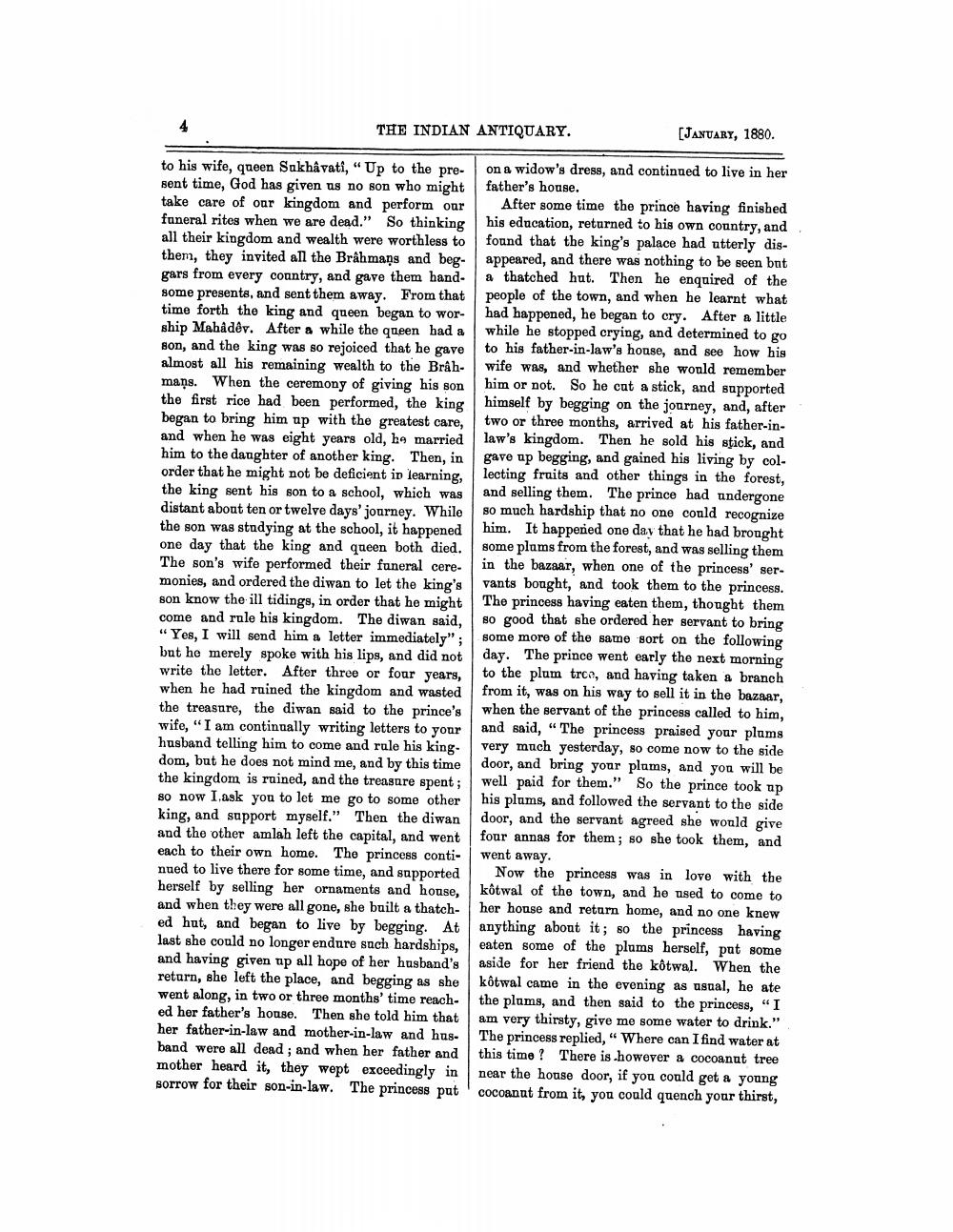________________
THE INDIAN ANTIQUARY.
[JANUARY, 1880.
to his wife, queen Sokhâvati, "Up to the pre- sent time, God has given us no son who might take care of our kingdom and perform our funeral rites when we are dead." So thinking all their kingdom and wealth were worthless to them, they invited all the Brâhmans and beggars from every country, and gave them handsome presents, and sent them away. From that time forth the king and queen began to worship Mahadev. After a while the queen had a son, and the king was so rejoiced that he gave almost all his remaining wealth to the Brahmans. When the ceremony of giving his son the first rice had been performed, the king began to bring him up with the greatest care, and when he was eight years old, he married him to the daughter of another king. Then, in order that he might not be deficient in learning, the king sent his son to a school, which was distant about ten or twelve days' journey. While the son was studying at the school, it happened one day that the king and queen both died. The son's wife performed their funeral ceremonies, and ordered the diwan to let the king's son know the ill tidings, in order that he might come and rule his kingdom. The diwan said, " Yes, I will send him a letter immediately"; but ho merely spoke with his lips, and did not write the letter. After three or four years, when he had ruined the kingdom and wasted the treasure, the diwan said to the prince's wife, "I am continually writing letters to your husband telling him to come and rule his kingdom, but he does not mind me, and by this time the kingdom is ruined, and the treasure spent ; so now I ask you to let me go to some other king, and support myself." Then the diwan and the other amlah left the capital, and went each to their own home. The princess continued to live there for some time, and supported herself by selling her ornaments and house, and when they were all gone, she built a thatched hut, and began to live by begging. At last she could no longer endure such hardships, and having given up all hope of her husband's return, she left the place, and begging as she went along, in two or three months' time reached her father's house. Then she told him that her father-in-law and mother-in-law and husband were all dead; and when her father and mother heard it, they wept exceedingly in sorrow for their son-in-law. The princess put
on a widow's dress, and continued to live in her father's house.
After some time the prince having finished his education, returned to his own country, and found that the king's palace had utterly disappeared, and there was nothing to be seen bnt a thatched hut. Then he enquired of the people of the town, and when he learnt what had happened, he began to cry. After a little while he stopped crying, and determined to go to his father-in-law's house, and see how his wife was, and whether she would remember him or not. So he cut a stick, and supported himself by begging on the journey, and, after two or three months, arrived at his father-inlaw's kingdom. Then he sold his stick, and gave up begging, and gained his living by collecting fruits and other things in the forest, and selling them. The prince had undergone so much hardship that no one could recognize him. It happened one day that he had brought some plums from the forest, and was selling them in the bazaar, when one of the princess' servants bought, and took them to the princess. The princess having eaten them, thought them so good that she ordered her servant to bring some more of the same sort on the following day. The prince went early the next morning to the plum trco, and having taken a branch from it, was on his way to sell it in the bazaar, when the servant of the princess called to him, and said, “The princess praised your plums very much yesterday, so come now to the side door, and bring your plams, and you will be well paid for them." So the prince took up his plums, and followed the servant to the side door, and the servant agreed she would give four annas for them; so she took them, and went away.
Now the princess was in love with the kôtwal of the town, and he used to come to her house and return home, and no one knew anything about it; so the princess having eaten some of the plums herself, put some aside for her friend the kôtwal. When the kôtwal came in the evening as usual, he ate the plums, and then said to the princess, "I am very thirsty, give me some water to drink." The princess replied, "Where can I find water at this time? There is however a cocoanut tree near the house door, if you could get a young cocoannt from it, you could quench your thirst,




